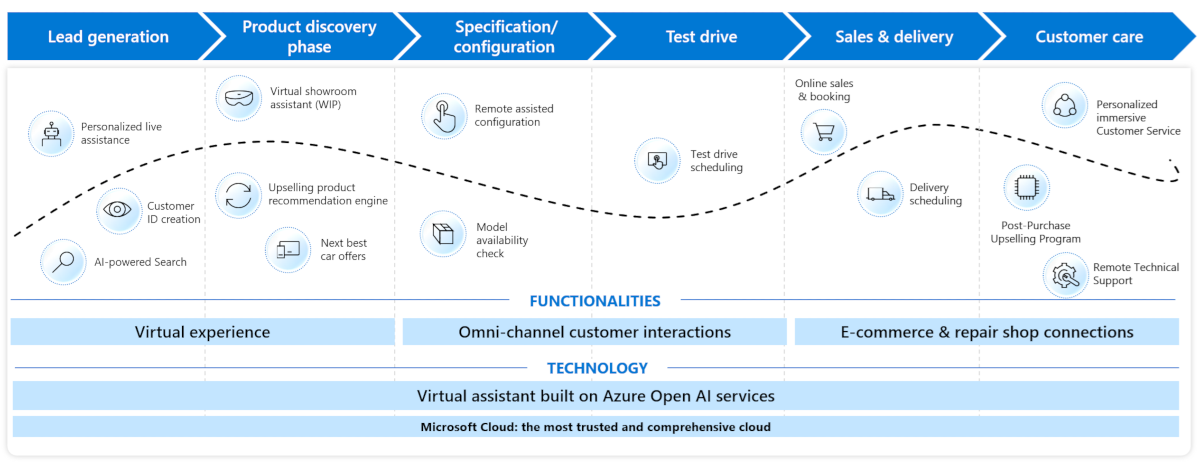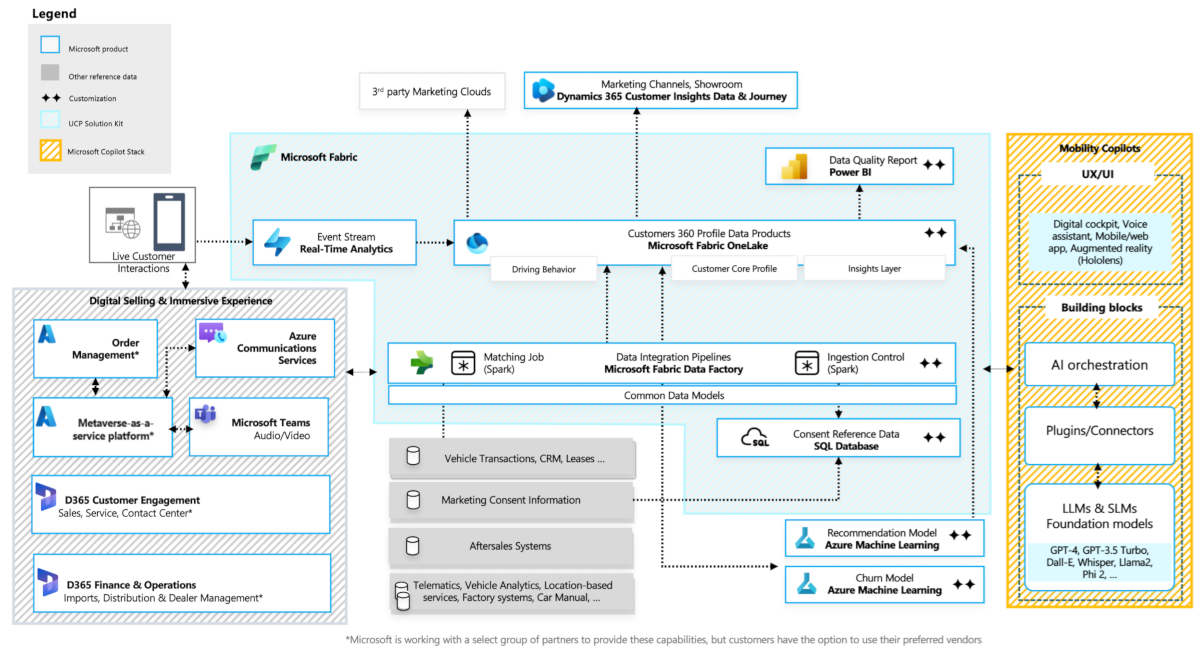Reference architecture for digital selling
Digital selling is a comprehensive digital retailing offer that empowers mobility service providers and marketers to use AI for promoting hyper-personalization while building customer trust and increasing brand loyalty and profitability. With the digital selling approach from Microsoft, you can adapt to the rapid changes in the mobility sector and focus on the customer's needs.
The traditional way of selling vehicles in person through a dealership network is changing. While some of the car-buying experience might be in-person; original equipment manufacturers (OEMs), dealers, and distributors need to provide their consumers with digitally accessible facilities such as:
- Informed browsing
- Demo ride digital booking
- Transaction transparency
You can create personalized omnichannel customer experiences by using a unified view of customer data from integrated marketing, sales, services, and connected devices. A Customer 360 blueprint sets the foundation for a unified customer data platform, such as data integration, pipelines, and consent management, to combine relevant data sources into a single view of the customer. The unified view of the customer is based on a harmonized data model using Microsoft Fabric to provide core data including unified customer identity.
Generative AI further elevates the customer-centric experience by allowing virtual assistants to guide customers throughout their car-buying journey. A copilot (a customer virtual assistant) can use product knowledge to help educate potential buyers and unlock new product discoveries.
Through the digital selling architecture, Microsoft is helping the industry transition their sales approach from a physical to a digital immersive experience across all touchpoints.
Microsoft is helping the mobility industry map out a clear strategy for their digital selling approach and has a partner ecosystem that offers immediate solutions for AI-guided selling, virtual showroom, connected commerce, and custom copilots.
Challenges
Some of the challenges in transitioning to digital selling include:
- Lack of customer data visibility preventing digital consumer outreach
- Siloed customer data between dealers, distributors, and OEMs
- Fragmented sales experience
- Lack of guided and personalized experience
- Product discovery and limited consumer education
- Lack of brand loyalty
Benefits of digital selling
Customers want readily accessible and clear information about their potential car purchase. OEMs, dealers, and distributors can meet evolving consumer needs and initiate an extended customer relationship. Digital selling offers the opportunity to connect and maintain an ongoing connection with customers through direct outreach.
Some of the benefits of digital selling include:
- Personalized marketing engagement: You can nurture interest and improve lead quality, integrate downstream sales processes, and include telemetry on sales performance.
- Seamless sales process: You can facilitate digital sales processes that flow seamlessly from digital to store, infuse AI for employee guidance, and personalize customer experience.
- Using the power of AI: You can consolidate connected vehicle and partner data for AI-augmented processes, personalized experiences, and new services offerings.
- Enriching data pipelines: You can use secure data, governance, and compliance standardization to nurture enrichment of first-party data pipelines.
- Driving industry standards: You can use Microsoft's unique position in the industry and global scale, to drive open data standards and systems transformation.
- Unlocking new revenue streams: You can know your customer needs and allow upselling and cross-selling opportunities.
Digital selling and unified customer reference architecture
Microsoft Azure provides digital selling components such as order management, customer engagement, finance and operations, and metaverse rendering. Azure also provides the fastest connectivity from your datacenter to the cloud through Azure ExpressRoute. This is important for customers who want to provide an immersive virtual experience.
The following diagram shows the reference architecture for digital selling.
In the diagram, the blocks with blue borders represent the Microsoft services that are either the underlying services or add-ons required to allow digital selling in the metaverse. Each of these services must be licensed separately. These components together help accelerate development of a solution that integrates eCommerce with metaverse and potentially dealer management solutions.
Enabling Microsoft technologies
Key Microsoft technologies that enable digital selling include:
| Enabling technology | Description |
|---|---|
| Dynamics 365 Customer Insights | Dynamics 365 Customer Insights can help you provide unmatched customer experiences by using world-class AI and analytics. This component transforms transactional and behavioral omnichannel data into a data estate that facilitates customer experience management. Within the context of the digital selling offering, Customer Insights gathers information about the customer that helps you personalize products and user experience within the metaverse. |
| Microsoft Dynamics 365 | Microsoft Dynamics 365 is a software-as-a-service (SaaS) offering, which provides several business applications for customer service, sales, marketing, project automation, customer insights, journey, and finance. Business applications are key enablers to the digital selling journey, as integrating them with the other technologies facilitates hyper-personalization in addition to cross-selling or upselling. In this architecture, Dynamics 365 primarily manages product catalogs and helps in customer service management. |
| Dynamics 365 Finance and Operations | Dynamics 365 for Finance and Operations is a comprehensive SaaS enterprise resource planning (ERP) solution. It provides end-to-end functionality for seamless orchestration of key business processes and supports digital selling use cases. It makes use of modules in Finance, Manufacturing, Supply Chain, or Retail. |
| Microsoft Digital Contact Center | Microsoft Digital Contact Center provides customer assistance in a virtual metaverse environment. It also offers capabilities across the entire breadth of contact center needs. The capabilities include case management, knowledge management, agent desktop, voice and routing, digital channels of engagement, collaboration tools, AI automation, and NLU-powered bots or interactive voice response (IVR). |
| Dataverse and Database Templates | The Common Data Model is a set of standardized, extensible data definitions, published by Microsoft and our partners. The Common Data Model provides consistency of data and its meaning across applications and business processes—creating a unified, shared data language. The Automotive Data Model extends the Common Data Model for deals, sales contracts, fleets, warranties, inspections, test drives, and more, providing insight and integration across automotive. Database templates are a set of business and technical data definitions that are predesigned to meet the needs of a particular industry. They act as blueprints that provide common elements derived from best practices, government regulations, and the complex data and analytic needs of an industry-specific organization. |
| Microsoft Teams | Microsoft Teams is a component of digital selling in the metaverse. It provides the front-end for interactions between the customers and dealers or presenters. Users can use a locally installed version or the web version. For more information on Teams, read the Microsoft Teams documentation. |
| Azure Data Lake Storage | Azure Data Lake Storage (ADLS) can store both structured and non-structured content. Unlike traditional data warehouses, after the large amount of data required for analytics is stored in Azure Data Lake, it's ready to be queried. The Azure Data Lake is a key component for storing digital selling consumer data that helps you tailor interactions for marketing, product configuration, and customer service. |
| Microsoft Fabric | Microsoft Fabric is an all-in-one analytics solution for enterprises that covers everything from data movement to data science, real-time analytics, and business intelligence. It offers a comprehensive suite of services, including data lake, data engineering, and data integration, all in one place. |
| Azure Messaging Services | Azure Messaging Services, encompassing Event Grid for event routing, Event Hubs for real-time data ingestion, and Azure Stream Analytics for on-the-fly data processing, ensure seamless interconnectivity between diverse components and applications across multicloud and on-premises environments. |
| Power Platform | Power Platform is a set of tools that analyzes data, builds solutions, automates processes, and creates virtual agents. It includes Power Apps, Power Automate, Power BI, and Power Virtual Agents. As part of Microsoft Power Platform, Dataverse is an easy-to-use, easy-to-manage, compliant, secure, scalable, and globally available SaaS data service. Dataverse empowers organizations to work with any type of data or app and use the data within it to gain insights and drive business action. |
| Microsoft Copilot Stack extensibility and Azure OpenAI Service | The Microsoft Copilot stack offers a robust AI infrastructure that enhances various aspects of the mobility industry. It provides a versatile base architecture that addresses a wide array of use cases, and ensures maximum efficiency and adaptability. The stack includes multi-modal enterprise-grade AI models, such as GPT-3.5 Turbo and GPT-4, which are part of the Azure OpenAI Service. The service lets you create custom AI applications and copilots, extending the capabilities of the Mobility Copilot across research and development, production, marketing and sales, and after-sales services. The Copilot stack can easily integrate into existing systems, and it offers swift deployment and unified data sourcing. |
Enabling partner technologies
Key partner technologies that enable digital selling include:
| Enabling technology | Description |
|---|---|
| Sitecore OrderCloud | Sitecore's OrderCloud is an API-based commerce service that provides order management for digital selling. All product-related information to conduct a transaction is retrieved from OrderCloud through simple HTTP (Hypertext Transfer Protocol) calls using Sitecore's API service. OrderCloud uses the Azure App Service to host the API and integration services. |
| Touchcast Metaverse Cloud and Studio, and Ciscape | Touchcast Metaverse Studio is built on a Windows-based client application, supported by Unreal Engine plugin architecture that facilitates the iterative and autonomous creation of dynamic Metaverse environments and Teams/web app authoring. It offers powerful insights for automotive sellers and dealers or presenters to gain more insight into the customer, create personalized user experiences, and improve conversions at a lower cost. Ciscape provides hyper-personalized generative AI experiences by effortlessly transforming existing legacy sites into a generative experience that continuously adapts to audience's persona and interactions. |
| Annata 365 | As a Microsoft GISV (global independent software vendor) since 2001, Annata brings modern business applications to the automotive and equipment industries to help organizations meet current business challenges and take advantage of new opportunities in the market. |
Next steps
Get started with the following article:
You can then refer to the following articles:
- Learn more about the Accelerate automotive transformation with new solutions from Microsoft
- Learn more about Microsoft automotive, mobility, and transportation reference architectures
- Learn more about the Automotive messaging, data, and analytics reference architecture

